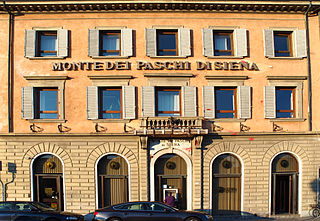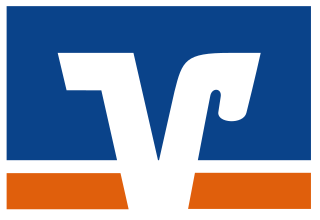
Islamic banking, Islamic finance, or Sharia-compliant finance is banking or financing activity that complies with Sharia and its practical application through the development of Islamic economics. Some of the modes of Islamic finance include mudarabah, wadiah (safekeeping), musharaka, murabahah (cost-plus), and ijara (leasing).

A financial institution, sometimes called a banking institution, is a business entity that provides service as an intermediary for different types of financial monetary transactions. Broadly speaking, there are three major types of financial institution:
- Depository institution – deposit-taking institution that accepts and manages deposits and makes loans, including bank, building society, credit union, trust company, and mortgage broker;
- Contractual institution – insurance company and pension fund
- Investment institution – investment bank, underwriter, and other different types of financial entities managing investments.

Microfinance is a category of financial services targeting individuals and small businesses who lack access to conventional banking and related services. Microfinance includes microcredit, the provision of small loans to poor clients; savings and checking accounts; microinsurance; and payment systems, among other services. Microfinance services are designed to reach excluded customers, usually poorer population segments, possibly socially marginalized, or geographically more isolated, and to help them become self-sufficient. ID Ghana is an example of a microfinance institution.
Triodos Bank N.V. is an ethical bank based in the Netherlands with many branches in Belgium, Germany, United Kingdom, and Spain. It was founded in 1980. The bank prioritises investment in environmentally friendly initiatives.

Cooperative banking is retail and commercial banking organized on a cooperative basis. Cooperative banking institutions take deposits and lend money in most parts of the world.
Micro financing in Tanzania started in 1995 with SACCOS and NGOs. It has since then contributed to the increasing success of international micro financing. Microfinance stills remains a relatively new in Tanzania since it has not penetrated yet. Since 1995, microfinance has been linked to poverty alleviation programs and women. The government made efforts to ensure commercial banks have continued to provide financial support to the small entrepreneurial business. However a microfinance National Policy was implemented in 2002 to encourage and support microfinances in the country. Since the implementation, micro financing was officially launched and recognized as a poverty alleviation tool. Due to its increase exposure and use in the nation, commercial banks have developed interests in to offer microfinance. There are various microfinance banks that functions as supporting institutions in the country that usually provide microfinance services. These may include the CRDB, National Microfinance Bank, and AKIBA. However there are also other few banks that are concerned with micro financing in Tanzania such as the PRIDE and SEDA, Tanzania Postal Bank and FINCA. Community and small banks have also expressed interest in the same including the NGOs and other non-profit organizations.

Socially Responsible Investing (SRI), "Responsible", "Sustainable", "Social", or "Ethical" investing, is any investment strategy which seeks to consider both financial return and social/environmental good. The areas of concern recognized by the SRI practitioners are sometimes summarized under the heading of ESG issues: environment, social justice, and corporate governance.
Before Uganda's independence in 1962, the main banks in Uganda were Barclays ; Grindlays, Standard Bank and the Bank of Baroda from India. The currency was issued by the East African Currency Board, a London-based body. In 1966, the Bank of Uganda (BoU), which controlled the issue of currency and managed foreign exchange reserves, became the central bank and national banking regulator. The government-owned Uganda Commercial Bank and the Uganda Development Bank were launched in the 1960s. The Uganda Development Bank is a state-owned development finance institution, which channeled loans from international sources into Ugandan enterprises and administered most of the development loans made to Uganda.

A banking agent is a retail or postal outlet contracted by a financial institution or a mobile network operator to process clients’ transactions. Rather than a branch teller, it is the owner or an employee of the retail outlet who conducts the transaction and lets clients deposit, withdraw, transfer funds, pay their bills, inquire about an account balance, or receive government benefits or a direct deposit from their employer. Banking agents can be pharmacies, supermarkets, convenience stores, lottery outlets, post offices, and more.
Wizzit is a provider of basic banking services for the unbanked and underbanked in South Africa. Its services are based on the use of mobile phones for accessing bank accounts and conducting transactions, in addition to a Maestro debit card that is issued to all customers upon registration. Wizzit is a branchless banking business, meaning that its services are designed so that customers can generally conduct transactions without the need to visit bank branches.

Oikocredit is a cooperative society that offers loans or investment capital for microfinance institutions, cooperatives and small and medium-sized enterprises in developing countries. It is one of the world's largest private financiers of the microfinance sector. The idea for Oikocredit came from a 1968 meeting of the World Council of Churches. Following this, Oikocredit was established in 1975 in the Netherlands.

The German Cooperative Financial Group is a major cooperative banking network in Germany that includes local banks named Volksbanken and Raiffeisenbanken, the latter in tribute to 19th-century cooperative movement pioneer Friedrich Wilhelm Raiffeisen. The Cooperative Group represents one of the three "pillars" of Germany's banking sector, the other two being, respectively, the Sparkassen-Finanzgruppe of public banks, and the commercial banking sector represented by the Association of German Banks.
Banking or banking activity that complies with Sharia —known as Islamic banking and finance, or Sharia-compliant finance—has its own products, services and contracts that differ from conventional banking. Some of these include Mudharabah, Wadiah (safekeeping), Musharakah, Murabahah, Ijar (leasing), Hawala, Takaful, and Sukuk.
Letshego Bank Tanzania Limited, commonly known as Letshego Bank is a commercial bank in Tanzania, licensed by Bank of Tanzania, the central bank and national banking regulator.
Hattha Kaksekar Limited or HKL is a microfinance institution and a deposit-taking institution in Cambodia. In terms of loan portfolio, HKL is ranked fourth and it has the third largest saving portfolio among Cambodia MFIs.
AccessBank Liberia (ABL), is a microfinance commercial bank in Liberia. It is one of the commercial banks licensed by the Central Bank of Liberia, the national banking regulator.
The Global Alliance for Banking on Values (GABV) is an independent association of 'values-based banks' with a shared mission to use finance to deliver environmental, social, and corporate governance (ESG) positive outcomes. The GABV consists of over 60 member banks, credit unions and microfinance institutions, from a total of 44 countries. The group has 16 supporting partners. Its headquarters are in Amsterdam, Netherlands.
Bandhan Bank Ltd. is a banking and financial services company, headquartered in Kolkata. Bandhan Bank is present in 35 out of 36 states and union territories of India, with 6,250 banking outlets and 3.26 crore customers. Having received the universal banking licence from the Reserve Bank of India, Bandhan Bank started operations on August 23, 2015, with 501 branches, 50 ATMs and 2,022 Banking Units (BUs). The Bank has mobilised deposits of ₹1,17,422 crore and its total advances stand at ₹1,15,940 crore as of December 31, 2023.

Pax-Bank eG is a German bank that focuses on Christian finance headquartered in Cologne. The bank states that it is a German: Bank für Kirche und Caritas, a cooperative Catholic universal bank. Its members consist of institutions of the Catholic Church and private individuals from the clerical field. The bank was founded as a self-help organization by and for priests in 1917 in Cologne.

The Bank für Kirche und Diakonie eG - KD-Bank is a credit institute in Dortmund in the legal form of a listed cooperative. The members are mostly institutions from the area of the Protestant church and its deaconry. The KD-Bank specializes in answering all financial questions in this sector. The bank offers private customers the full range of banking services. Its goal is not primarily profit maximization but the economic support of members and customers. The bank is a member in the Bundesverband der Deutschen Volksbanken und Raiffeisenbanken (BVR).










